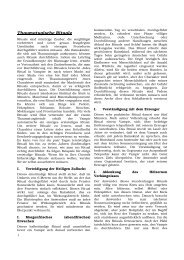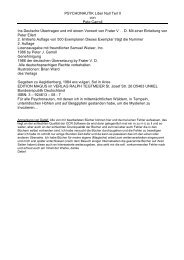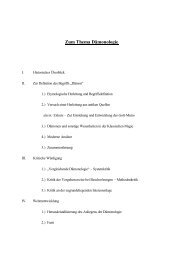CHAPTER 2 CHAPTER 3 CHAPTER 1 CHAPTER 2 CHAPTER 3 ...
CHAPTER 2 CHAPTER 3 CHAPTER 1 CHAPTER 2 CHAPTER 3 ...
CHAPTER 2 CHAPTER 3 CHAPTER 1 CHAPTER 2 CHAPTER 3 ...
You also want an ePaper? Increase the reach of your titles
YUMPU automatically turns print PDFs into web optimized ePapers that Google loves.
<strong>CHAPTER</strong> 3 51<br />
The Hebrew meaning of the word seems to be "brilliant", "splendid", "illustrious", or as in the Septuagint,<br />
Vulgate, the Rabbinical commentators, Luther, and others, "brilliant star!" and in this sense was the proper<br />
name among the Hebrews of the morning star. Tertullian and Gregory the Great understood this passage of<br />
Isaiah in reference to the fall of Satan; in consequence of which the name Lucifer has since been applied to<br />
Satan; and this is now the usual acceptation of the word.<br />
Dr. Henderson in his Isaiah renders the line: "How art thou fallen from heaven, O illustrious son of the<br />
morning!" Dr. Henderson says: "The application of this passage to Satan, and to the fall of the apostate angels,<br />
is one of those gross perversions of Sacred Writ which so extensively obtain, and which are to be traced to a<br />
proneness to seek for more in any given passage than it really contains."<br />
The only place in the Holy Bible where the word Lucifer is found is in Isaiah. The early church fathers were<br />
under the impression that, the passage could only refer to Satan, the prince of darkness. However, Satan in the<br />
Bible has no connection with the Lucifer of Isaiah.<br />
Isaiah was figuratively speaking of the king of Babylon in reference to his glory and pomp, but he was<br />
actually referring to the destruction of a planet known to the ancient world as the "shining one". Lucifer and<br />
its remains are now to be observed in the telescope as the Asteroid Belt.<br />
By a curious chain of reference the passage in Luke 10:18 once was thought to refer to Isaiah 14:12, but this<br />
passage says: "I beheld Satan as Lightning fall from heaven." Even though this passage speaks of Satan,<br />
Lucifer became the chief of the fallen angels, the name borne by Satan before his rebellion. However, it must<br />
be stated again that Satan is in no way connected with Lucifer.<br />
In "_The Saucers Speak!_" Zo said: "Your so-called Hydrogen Bomb could make an asteroid belt out of you.<br />
This happened many years ago to the planet of what you would call the fifth orbit. We knew what they were<br />
doing but we didn't interfere. We cannot stand by and see another waste. After their destruction there were<br />
terrible disasters on Masar (Mars). Great volcanic eruptions took place. Many of our people perished. We<br />
would have been thrown out of this Solar System and lost if we had not quickly constructed two artificial<br />
satellites. Some of you scientists have noticed that our so-called moons Phobos and Deimos reflect too much<br />
light to be made of earthy substance. They are right. They are metallic in nature. They readjusted our unstable<br />
condition and saved a planet."<br />
It is true that the ancient poets knew of the satellites of Mars before their discovery and ancient astrological<br />
works mention them. Jonathon Swift in "Gulliver's Travels", 1726, wrote that Mars had two satellites and his<br />
complete description of them was most accurate. They were actually discovered as late as 1877 by Asaph Hall<br />
of the Naval Observatory in Washington, D. C. How did Swift and all these other individuals know that Mars<br />
had two moons?<br />
If the Prophet Isaiah was actually referring to a "fallen star" or a destroyed planet let us see if his description<br />
as found in the fourteenth chapter fits such a happening.<br />
To begin with he wonders how Lucifer, then a morning star, fell from heaven. A morning star now can be<br />
Jupiter, Mars, Saturn or Venus when rising shortly before the sun, and forming a conspicuous object in the<br />
sky just before dawn; hence, figuratively, a forerunner, or one who announces and guides. For a planet to be<br />
called the morning star it must be West of the sun and visible before sunrise. When bright planets are East of<br />
the sun and therefore visible in the early evening they are called evening stars. The ancients not realizing they<br />
were the same stars in different roles, called Venus when the evening star, Hesperus or Vesper and when it<br />
was the morning star, Phosphorus. Mercury was called Mercury when it was the evening star, but it was called<br />
Apollo when it was a morning star:<br />
When we think of morning star now we immediately associate it with the planet Venus. Therefore, we think






